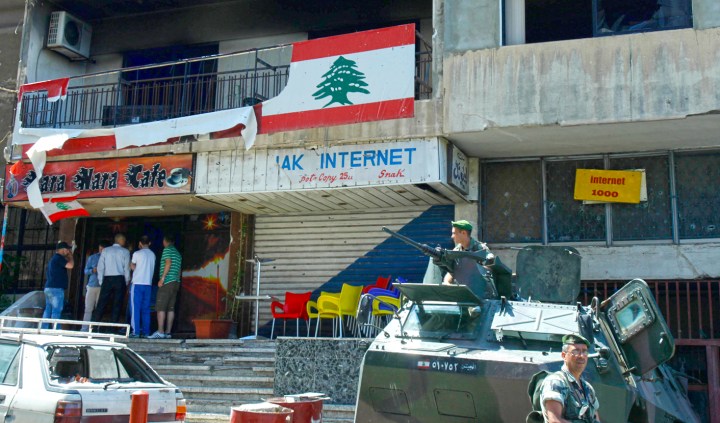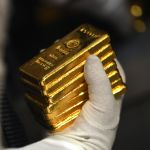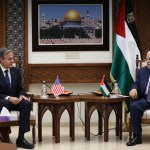Newsdeck
Lebanon’s new wild card: Shaker al-Barjawi

The murder of Sunni cleric Sheikh Ahmad Abdul Wahed on Sunday, and the street battles that followed, forced a new chapter in Lebanon's sectarian tensions and put the name of pro-Syria Arab Movement Party leader Shaker al-Barjawi on everyone's lips. By SAMI MOUBAYED
The writing had been on the wall for weeks, signalling Lebanon might explode at any minute. The reason was Syria. For more than a year, battle lines had been clearly drawn between pro-Bashar al-Assad and anti-Assad politicians in Lebanon, with the March 14 Alliance desperate to see regime change in Syria, and Hezbollah and its allies willing to fight. On Arabic satellite talk shows, members of the two camps had blasted at each other for months, once even getting into a fist-fight live on air.
Last week, pro-Syrian regime and anti-Syrian regime factions clashed in Tripoli, prompting Bahrain, Qatar and the United Arab Emirates to advise their citizens against travelling to Lebanon and those already in the country to leave.
On Sunday, Sheikh Ahmad Abdul Wahed, a prominent Sunni cleric, was shot dead at a checkpoint in Akkar in northern Lebanon, along with his bodyguard, when his car reportedly failed to stop at a military checkpoint. They were headed for Halba for a sit-in against the Syrian regime.
By nightfall, angry young men were burning tyres in protest, cutting off main roads. Similar scenes took place in the Eastern Bekka Valley, Akkar and in Beirut itself. Two more people were killed and another 18 wounded. Gunmen fired rocket-propelled grenades and live ammunition in one mainly Sunni district. The fighting was between Hariri loyalists and the pro-Syria Arab Movement Party, headed by Shaker al-Barjawi.
Whoever ordered the murder knew it would have a dramatic impact on the country’s already boiling sectarian tensions. Lebanese Sunnis are frustrated, to say the least, by a Sunni prime minister, Najib Mikati, who many believe can no longer deliver. Members of the Hariri team accuse of him of being a pawn in the hands of Hezbollah. Although Mikati has pledged neutrality in the Syrian crisis, many believe he remains pro-Syria.
The wild card in the complex Lebanese scene, however, is Shakib al-Barjawi, a veteran of the Lebanese civil war (1975-1990) who seemingly emerged out of nowhere and is now on everybody’s radar. He has all the credentials needed to lead a Sunni militia that could serve as Hezbollah’s proxy in Lebanese domestics. Little is known about Berjawi beyond the narrow web of Beiruti politics, apart from the fact that he is a staunch supporter of the Syrian regime, and that his Arab Movement Party is by no means a political heavyweight.
How then did it rise out of nowhere to take the streets of Beirut, reminiscent of May 2008 when Hezbollah and Hariri’s loyalists clashed in Beirut? Then, Hezbollah took the Lebanese capital in a matter of hours, disarming Hariri’s men and igniting public outrage from Sunnis. Probably because of that incident, and the outrage and fear it triggered among Lebanese Sunnis, Shi’ite Hezbollah might have reasoned it was better to create a Sunni proxy to do the job, should similar disturbances arise in future.
Shaker al-Barjawi, 51, grew up under the influence of his father, a customs official who was one of the founders of the Lebanese branch of the Ba’ath Party, established in Syria in 1947. At one point, he was loyal to the Iraqi branch of the Ba’ath and according to Al-Jazeera briefly fought alongside the Iraqi army during its eight-year war with Iran in the 1980s.
Then, there was nothing but bad blood between him and Damascus, due to historic rivalries between the Syrian and Iraqi Ba’ath. His nom du guerre was Abu Bakr (after the first caliph of Islam who succeeded the Prophet Mohammad in 631) – a historical figure loathed by Shi’ites and the mullahs of Tehran.
After the Israeli invasion of Beirut in 1982, al-Bajrawi parted ways with the Iraqi Ba’ath after Saddam Hussein began building bridges with then-president Amin Gemayel. He briefly affiliated himself with a Lebanese Muslim cleric named Abdu Hafiz Qasem, famed for his inflammatory speeches against Gemayel at the mosques of Tarik al-Jadideh.
He found common ground with the Syrians when they began working against Gemayel’s short-lived peace treaty with Israel, befriending Amal Movement’s Nabih Berri (the current speaker of parliament) and Walid Jumblatt (who was pro-Syria until 2005).
Berri and Gemayel tried to prop him up as a local Sunni chieftain in Beirut, hoping he would replace Ibrahim Quleilat, who was close to Palestinian Liberation Organisation’s Yasser Arafat.
Barjawi cuddled up to Arafat, which strained relations with Damascus and Amal, travelling to Tunis to meet the Palestinian leader in 1991. After which he was arrested and jailed in Syria, only to be released by Jumblatt and then-Lebanese defence minister Muhsen Daloul, who lobbied on his behalf with Syrian officials.
Thanks to Syria’s paramount influence in Lebanon in the 1990s, Barjawi mended his relations with Damascus, setting up the Arab Movement Party to softly challenge the policies of then-prime minister Rafik al-Hariri. During this time, he established close ties with Hezbollah, despite his previous rivalries with Iran and strong Sunni tendencies.
Speaking to Lebanon’s Assafir newspaper in 2008, Barjawi admitted all his political acrobatics, saying they were due to a “lack of proper judgement”, claiming that his prime objective was “defending Beirut and its residents”. He denies that he is on the payroll of Hezbollah.
Although Hezbollah has been remarkably silent about the recent developments, Barjawi has been very vocal, saying that Hariri’s Future Movement had opened a Pandora’s box, “especially after it killed two members of the Arab Movement in cold blood” [during Monday’s clashes].
He added “a hundred-thousand bullets were shot within hours and four-wheel vehicles came [from Saad al-Hariri’s residence in downtown Beirut] carrying ammunition.”
We don’t know for sure who killed Sheikh Abdul Wahed. Was it an accident or was it planned and orchestrated by pro-Syria Lebanese figures? What we do know is that a new chapter has been opened in Lebanese politics – which perhaps will outlive the Syrian uprising itself – and the man to watch will be Shaker al-Barjawi.DM
Credit: This edited article is used courtesy of Asia Times Online (http://www.atimes.com/), who retain copyright.
Photo: Lebanese army soldiers are seen with their armored vehicle near the burnt offices of the pro-Syrian Arab Movement Party after overnight clashes between Sunni Muslim Future movement supporters and a pro-Syrian group in the Tariq al-Jadideh district in Beirut May 21, 2012. REUTERS/Sharif Karim


















 Become an Insider
Become an Insider